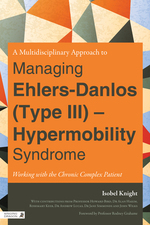| Description |
A Multidisciplinary Approach to Managing Ehlers-Danlos (Type III) - Hypermobility Syndrome
Working with the Chronic Complex Patient
Isobel Knight
With a contribution from Professor Howard Bird, Dr. Alan J. Hakim, Rosemary Keer, Dr Andrew Lucas, Dr Jane Simmonds and John Wilks
Foreword by Professor Rodney Grahame
The complex effects of Ehlers-Danlos Syndrome (Type 3, Hypermobility), or EDSIII, on a patient's physical and mental wellbeing are extremely challenging for everyone involved, requiring a multidisciplinary care team and enormous dedication from the patient.
This book presents an overview of what it means to be a chronic complex patient, examining the wide range of physiological and psychological implications associated with EDSIII and other conditions such as endometriosis and fibromyalgia. It explores the exercise and rehabilitation work involved in managing the condition effectively, considering a diverse range of medical treatments and complementary approaches including physiotherapy, Bowen Technique and Feldenkrais Method(R). There are contributions and insights throughout from experts in the fields of physiotherapy, rheumatology and health psychology, all of whom have extensive experience of working with complex chronic patients. The author links her own symptoms and experiences to those of other EDSIII patients and discusses how she has been able to reach a point where she can successfully manage the condition.
This book will be essential reading for professionals working with EDSIII and other complex conditions including medical professionals, physiotherapists, occupational therapists, psychologists, counsellors and complementary therapists, and will be of interest to patients with EDSIII wanting to learn more about effective management of the condition.
Contents
Acknowledgements. Preface. Introduction. Part I. The Body and the Self. 1. The Body and the Self in Illness and Health and Autoethnographical Writing. 2. Isobel's Story. 3. Visit to Consultant Rheumatologist, Professor Howard Bird. 4. Implications of Diagnosis. Part II. Physiology. 5. Maslow Hierarchy of Needs and Homeostasis. 6. Postural Orthostatic Tachycardia Syndrome (POTS) and Autonomic Nervous System (ANS). 7. Digestion and Bowel. 8. Bladder. 9. Surgical and Nursing Implications for the EDSIII/Chronic Complex Patient. 10. Hormonal Aspects of Hypermobility and Living with Endometriosis. 11. Sleep and Fatigue. 12. Fatigue and Unexpected Responses to Treatment and Incidents. 13. Crisis, Flare-ups and Management. 14. The Chronic Complex Patient and Pain Management. Part III. Psychology. Psychology Preface. 15. How Patients Present Themselves – Isobel's Experience as a Bowen Therapist and Rosemary Keer's Experience as a Physiotherapist. 16. The Physiotherapist and Patient Relationship. 17. Goal-setting and Patient Review. 18. Trust (and Economics). 19. The Challenging Patient. 20. The Doctor/Patient Relationship and Treatment of Chronic Complex Patients. 21. Learning Styles and Learning 'Difficulties'. 22. Social Media, Forums and Support Groups. 23. Self Harm, Anxiety and Depression. 24. Cognitive Analytical Therapy (CAT). 25. Managing Chronic Complex Patients with Psychological Issues – Isobel's Personal Reflection. 26. Terminating Client Relationships. 27. I'm Not Mad; I have EDS so Why do I Need to see a Psychologist? Dr Andrew Lucas' Account of Treating EDS Patients at the Royal National Orthopaedic Hospital. Part IV. Exercise and Rehabilitation. 28. Exercise and Rehabilitation – EDS Patient Experience of Physiotherapy and Isobel's 'Stages' of Treatment. 29. Imaging Exercises and 'Less is More'. 30. Pilates and 'Physiolattes' – Core Stability and Lumbar Spine. 31. Movement Patterns; Overuse and Muscle Stiffness. 32. Neurology and Movement Disorders. 33. Subjective Outcomes. 34. Returning to Normal Life. 35. Speech, Swallowing, TMJ and Eye Problems. 36. Cervical Spine. 37. The Trauma of Birth and Post Traumatic Stress Disorder. 38. Bowen Technique and Working on Fascia and Connective Tissue Disorders. 39. Feldenkrais Method®. 40. Cardiovascular and Endurance Work. 41. Isobel 'Now' and Thoracic Spine. 42. Conclusion. Appendix 1. Sample Forms. Appendix 2. Useful Contacts. Appendix 3. Diagnostic Criteria. Bibliography. Index.
Reviews
'This second book by Isobel Knight on Ehlers-Danlos Syndrome (Type III) is targeted at medical professionals and offers a unique combination of the latest research on the subject plus her own experiences as a sufferer of one the hypermobility syndromes (Type III). Despite the target audience being medical professionals the book will no doubt be read by the vast numbers of people suffering from a hypermobility syndrome who hunger for information. One of the downfalls of having a multi-systemic condition is that often professionals from differing disciplines do not communicate with each other…this book pulls together all of the information available which makes it a must read for all who work with people with Ehlers-Danlos Type III.'
- Donna Wicks, Senior Medical Liaison Officer, The Hypermobility Syndrome Association
'This unique book is recommended for health professionals wishing to gain a lived experience perspective of JHS/EDS III. The author has invested considerable time and energy researching, reflecting and understanding the complexities of this condition. The result is a culmination of an autoethnography with clinical explanations.'
- Carol J. Clark, MCSP, MSc, PhD, Lecturer in Physiotherapy, Bournemouth University
'A fantastic read for anyone living with Ehlers-Danlos Syndrome, especially the Hypermobility type. Isobel's personal account of day-to-day life with the condition provides detailed descriptions and insights on how to cope, backed up by good medical information, I highly recommend.'
- Lara Bloom, Development Manager, EDS UK
'Isobel Knight, by drawing on her own life-long experience for the benefit of others, helps them to make their own journey through EDS3HMS, a less daunting, less frightening and less lonely experience. Such is the real value of this book. And, of course, it also makes for salutary reading for medical professionals.'
- From the Foreword by Professor Rodney Grahame, CBE MD FRCP FACP FRSA, Honorary Consultant Rheumatologist, University College Hospitals, London, Honorary Professor, Division of Medicine, University College London and Affiliate Professor, School of Medicine, University of Washington, Seattle WA, USA
Author information
Isobel Knight is a writer, researcher and periodic lecturer on Ehlers-Danlos (Type III) Hypermobility Syndrome. Isobel is also a practising Bowen Therapist and lives in South London.
|


